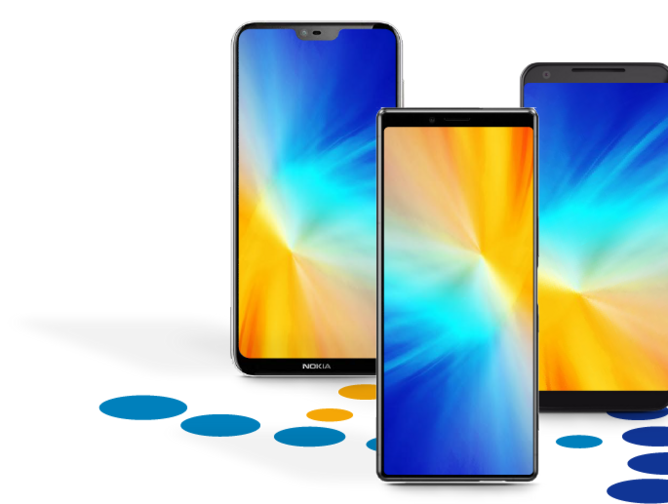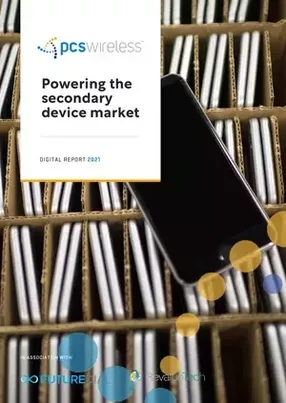An entrepreneur will always find a niche in the market. Twenty years ago in New York the founders of PCS Wireless seized on the potential of a secondary market for mobile phones as they found slightly used devices had a market as consumers sought the latest offerings from Nokia or Ericsson, Motorola, and others.
Today, with sustainability being at the top of the agenda, PCS is a telecommunications company with a turnover of over US$1.3 bn. They have a footprint in four continents, operating in 80 countries, selling affordable Apple or Samsung smartphones along with tablets and wearables to people who need a cost-effective option.
Bashar Nejdawi, Chief Operating Officer of PCS, spoke from his New Jersey office on how the company is leading the way in powering the secondary device market. This is not only giving a boost to developing economies, but also offering a lifeline to people who can now own a reconditioned mobile to finally connect with family and friends.
Billions of smartphones are used around the world and according to recent research, a new phone will now have three or more owners in its lifetime thanks to the secondary market - “which is good news for the environment,” said Nejdawi.
“Sustainability is very important for PCS, because all the devices we circulate back into the secondary market would have just ended up in landfills, or worse, not disposed of correctly. Reducing the carbon footprint is critical. PCS is in the centre of the global sustainability movement. We offer the chance for mobile devices to be refurbished and properly graded before they are re-circulated.”
Nejdawi highlighted that by circulating secondary devices into a developing market from Africa to SE Asia, there is a focus on three areas:
- Sustainability
- Positive social impact
- Economic advantage
“From a business perspective, this allows people to have the connectivity, to be able to conduct business. As the infrastructure in these countries develops further and moves towards 4G and ultimately 5G, these cost-effective devices are a critical part of the economic growth of those countries.
“A reconditioned mobile also provides a lifeline for many people who can now access healthcare and connect with loved ones which was crucial during the pandemic. People don’t want to live in a throwaway world any more,” said Nejdawi.
PCS has developed and grown a multichannel customer base and network of industry partners including FutureDial and RevalueTech along with OEMs, wholesalers, retailers, e-commerce and logistics providers in the Americas, Asia-Pacific, and EMEA. “We also have device processing capabilities in five countries and sell devices in more than 80 countries worldwide,” commented Nejdawi.
Access to supply, analytical capabilities of data - that offers best value for their partners on buyback and trade-in programmes have given PCS the competitive edge. “Leveraging our operational capability has also given us a key advantage because we have flexibility and agility. Our presence in a number of strategic locations has allowed us to be close to the market.”
Entrepreneurial spirit
Reflecting on its humble beginnings back in 2001 in Brooklyn, Nejdawi points out how the founders saw an opportunity grow from their original business of selling new devices into the retail or wholesale market. The wireless device reseller has now grown to become the global leader in the secondary mobile device industry.
“When people wanted to upgrade, they were bringing devices back which just needed to be refurbished. However, there was no ecosystem that took these devices. tested and connected them and put them in the hands of the people who could use them and did not want to pay the full amount,” commented Nejdawi.
“PCS founders saw an opportunity as they were getting used devices back through retailers they were working with. These mobiles just needed to be refurbished and tested to ensure they were properly graded before being re-sold, but there was no ecosystem for these devices. To ensure they were put into the hands of people who could use them, such as those who didn't want to pay the full amount but simply wanted a functional used device, PCS’s original business of selling new devices grew into the secondary market and has been driving the market ever since with a growing business model.
Global presence
PCS works with global companies to source and re-allocate mobile phones and to extend device life cycles. The company operates from six warehouse facilities across the world’s major hubs for smartphone sales: New Jersey (HQ), Dubai, Japan, HK, and the Netherlands.
“We have a total of 300,000 square feet of warehouse space which enables speedy and efficient turnaround of product. Our commercial offices are based in New Jersey (HQ), Australia, Dubai, Japan, UK, NL, and Taiwan,” said Nejdawi.
PCS handles 10 million handsets a year in terms of processing and have more than 3,000 SKU’s in their system. They have more than 1,300 channel partners and 1,000 employees across the world. “We work to ensure we match each customer’s precise needs.”
5G boost for future secondary market
PCS is predicted to grow to US$5B by 2025. The launch of 5G is expected to result in millions of 4G and 3G devices in the secondary market. Devices such as wearables will also come through the IoT ecosystem which will shape the future of the secondary market.
“We are followers of technology that is launched in the marketplace. The growth of 5G in the next couple of years is a key driver for the secondary market as there will be so many 3G or 4G devices that people will replace with the new models. This will allow other players in the marketplace to utilise those older devices, and we can feed them back into the system. The technology platform for buyback and trade is also being deployed across OEMs, carriers, retailers, and online.
“This is going to be a fairly substantial volume globally and great for our industry and developing economies as we can make those devices available at a much more affordable cost into a variety of countries.”
“We also keep a close eye on technologies like Virtual Reality (VR) and Augmented Reality (AR), in terms of the type of equipment that's being used, and expect that to transition into the secondary market,” said Nejdawi.
“We have to understand new technologies to allow us to build up the capabilities to process them which is a critical part of working with OEMs as well as working with our key technology partners.”
“At PCS we look at data and analytics as a technology platform and utilise those internally to help us with operational decision-making and purchasing as well as leveraging it for the services and capabilities that we offer to our channel partners.”
Critical role of global partners
Strong technology partners are critical to the success of PCS. “Everything we do is based on our technology platform. Working with companies like FutureDial on automation is the key for our development. It is vital for our future technology base and building our technology platform for our processing capabilities and the ability to be able to do diagnostics and grading,” said Nejdawi.
“Working with Revalue Tech in Enterprise Mobility has allowed us to extend the availability of used devices into that segment of the market as well as develop innovative enterprise grade service offering in partnership.
“Mobile devices and other consumer devices require a new ecosystem that can deliver convenience, savings, and transparency throughout the device ownership experience.”
Nejdawi commented that the future of mobile devices will revolve around content and content delivery. “Video streaming and availability of the content through the various sources is what's going to drive the next evolution for technology.”
With a local presence in every major market, and a strong leadership team that’s passionate about building the secondary market, PCS is focused on helping their partners achieve objectives year after year.
Gold medal for the ultimate recycling of smartphones
As PCS Wireless powers ahead with the secondary markets when it comes to smartphones, laptops and tablets, the Tokyo Olympics organising committee took the ultimate step in the journey of sustainability.
Anyone who watched the gleaming medals around the necks of great Olympians from US swimmer Caeleb Dressel to UK synchronised divers Tom Daley and Matty Lee may be surprised to learn that all 5,000 medals used during Japan’s 2020 Games and Paralympic Games were made from precious metals harvested from donated electronics.
Tokyo 2020 became the first Olympic Games to have awarded all medals created from recycled materials.
During the medal-making campaign that asked members of the public to donate discarded devices, the committee was overwhelmed with everything from smartphones and digital cameras to handheld gaming consoles and laptops.
In just 18 months the campaign received 47,488 tons of equipment, as well as more than 5m mobile phones handed in at stores run by local cell phone provider NTT. After 18 months, 28.4 kg of gold (93.7% of the targeted 30.3 kg) and 3,500 kg of silver (85.4% of the targeted 4,100 kg) had been collected from donations.
QUICK FIRE QUESTIONS
Bashar Nejdawi, Chief Operating Officer of PCS Wireless
How do you see wearables adapting to help post-pandemic?
“Wearables have really taken off and especially during the pandemic as a lot more people were stuck at home doing their own exercise routines and managing their own programmes and health. Therefore, we’ve seen a lot of growth in wearables during the past 18 months. Headsets were also selling like crazy as people adapted to working from home.”
Most exciting technology trend at the moment?
“The one that I find to be the most interesting is the utilisation of robotics and how this will enhance business in the future. Some people view robotics as replacing people, but I see that robotics will focus our people on a much higher level of technology-based activities. We can be more productive and upgrade a lot of the skill sets that we have for our operations and warehouse, but more importantly, it is going to drive Artificial Intelligence (AI) and machine learning (ML). This is going to be a critical part of the analytical decision-making for a technology platform company, in terms of analysing the pricing trends, the residual value curves, the purchasing and the lifecycle.”
How important is sustainability to PCS and how do you practice this?
“Sustainability is very important for PCS, because all those devices we circulate back into the secondary market would have just ended up in landfills, or worse still not disposed of correctly. Reducing the carbon footprint is critical. PCS is in the centre of the global sustainability movement. We offer the chance for mobile devices to be refurbished and properly before they are circulated back into the market.”
LIFE OUTSIDE THE OFFICE
Bashar Nejdawi, Chief Operating Officer of PCS Wireless
What are you most looking forward to doing when the pandemic is over?
Having dinner inside a restaurant.
Do you have a wearable device?
Yes, as I try to stay active and especially enjoy swimming.
Favourite movie?
The Godfather

- Bashar Nejdawi

